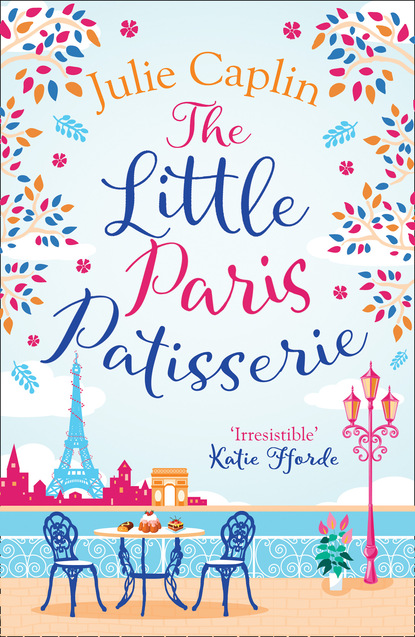
Полная версия
The Little Teashop in Tokyo

The Little Teashop in Tokyo
JULIE CAPLIN

One More Chapter
a division of HarperCollinsPublishers Ltd
1 London Bridge Street
London SE1 9GF
www.harpercollins.co.uk
First published in Great Britain by HarperCollinsPublishers 2020
Copyright © Julie Caplin 2020
Cover design by HarperCollinsPublishers Ltd 2020
Cover images © Shutterstock.com
Julie Caplin asserts the moral right to be identified as the author of this work.
A catalogue copy of this book is available from the British Library.
This novel is entirely a work of fiction. The names, characters and incidents portrayed in it are the work of the author’s imagination. Any resemblance to actual persons, living or dead, events or localities is entirely coincidental.
All rights reserved under International and Pan-American Copyright Conventions. By payment of the required fees, you have been granted the non-exclusive, non-transferable right to access and read the text of this e-book on screen. No part of this text may be reproduced, transmitted, down-loaded, decompiled, reverse engineered, or stored in or introduced into any information storage and retrieval system, in any form or by any means, whether electronic or mechanical, now known or hereinafter invented, without the express written permission of HarperCollins.
Source ISBN: 9780008393090
Ebook Edition © 2020 ISBN: 9780008393083
Version: 2021-03-26
Table of Contents
Cover
Title Page
Copyright
Dedication
Chapter 1: Haneda International Airport, Tokyo
Chapter 2
Chapter 3
Chapter 4
Chapter 5
Chapter 6
Chapter 7
Chapter 8
Chapter 9
Chapter 10
Chapter 11
Chapter 12
Chapter 13
Chapter 14
Chapter 15
Chapter 16
Chapter 17
Chapter 18
Chapter 19
Chapter 20
Chapter 21
Chapter 22
Chapter 23
Chapter 24
Chapter 25
Chapter 26
Chapter 27
Chapter 28
Chapter 29
Acknowledgements
Also by Julie Caplin
About the Author
About the Publisher
To Nick, Ellie and Matt, who thankfully are all brilliant at fending for themselves.
Chapter 1
Haneda International Airport, Tokyo
‘Blend in, Fiona, blend in,’ she told herself, the mantra an old and familiar one, while rubbing the back of one calf with her leg like an awkward stork and tugging at the tail of her long blonde plait. Which was totally ridiculous when she was surrounded by teeny tiny women scurrying about like super busy ants. Next to the petite, fey females with their delicate features and thick, lustrous, glossy hair, she felt like a woolly mammoth that had somehow lumbered onto a Paris catwalk. For a horrible moment it was like being back at school, surrounded by the cool girls and their scornful dismissal.
She sucked in what was supposed to be a calming breath but instead sounded more like a tortured wheeze. All around her people were being met, their names held up on little signs by slender men in immaculate suits. She was starting to remember what it was like never to be picked in PE, the duffer that no one wanted on their team.
Trying not to look as anxious as she felt, she peered again at the white signs, praying she’d spot her name. Her ears were ringing with that big-airport echo and her spine tingled with an increasing sense of dislocation. The flight had landed an hour ago, her baggage disgorged with what she’d already realised was Japanese optimum efficiency and here she was still waiting. It was tempting to check the document stuffed in her bag with all the details but doing that, again, would feel too needy and nervous. Trust the piece of paper and the promises made therein, Fiona, she told herself. She was here. She was bold. It was no secret she was massively out of her comfort zone but she was going to do this. Despite her mother’s reservations, this was the opportunity of a lifetime and one that she’d never believed would happen to her.
Winning the prize of an all-expenses-paid trip to Japan in conjunction with the Faculty of Arts at the Tokyo University Polytechnic was brilliant enough but the chance to exhibit her photographs at the Japan Centre in London was the icing on the cake. She was so thankful that she’d signed up for the evening course run by one of the London universities.
Digging her hand into her pocket, her fingers rubbed over the smooth ivory of the netsuke, the little carved figure that would once have been worn as part of traditional Japanese dress. The little rabbit carving travelled everywhere with her, the only thing she had from her father who died when she was a baby. It had inspired a vague, loose interest in Japan, so that when the competition had been announced, even without the prompting of her bossy friend Avril, she’d been tempted to enter. Avril had pushed temptation into action.
And now here she was for two weeks. Two weeks of experiencing everything Japan had to offer, including a mentoring programme with one of the best photographers in the world, Yutaka Araki. She’d worked hard on her application form and whether she believed it or not, she deserved to be here.
Her fingers itched to retrieve the carefully folded white piece of paper in her bag, for the reassurance of reading it just once more. Stop, she told herself, you know it quite clearly says that you’ll be met at Haneda International Airport. Someone with one of those neat little whiteboards bearing your name will be here any minute. It might even be the famous Yutaka Araki, himself. Her hand closed over her phone, nestled next to the little rabbit in the deep pocket of her mohair coat. No, she wasn’t going to get her phone out and check her messages. There was bound to be another text from her mother with an update on her blood pressure this morning. It regularly rose whenever Fiona did something her mother didn’t quite approve of.
Focusing on the airy space surrounding her and gazing around the crowded arrivals hall, she tried to analyse what made it so different. Thankfully some of the signs were in English as well as the fascinating but baffling Japanese calligraphy. Not being able to read basic information had been one of her biggest worries, along with the fact that she had never mastered using chopsticks and had never even tried sushi before because she really didn’t fancy raw fish. What on earth was she going to eat?
She swallowed hard. What if no one turned up? What would she do? A rising tide of despair began to take hold and she sighed and shifted to her other foot, gazing hopefully at approaching newcomers. Everything felt alien and uncomfortable. Although she could make out the Coca-Cola logo in the outsized vending machine opposite, the contents of all the other brightly coloured cans were utterly incomprehensible.
Her eyes lit on someone half running, half walking down the concourse towards her, his coat flapping. As he came closer, she narrowed her gaze. It couldn’t be. She was imagining things.
Oh, flipping heck with multiple bells on it.
It was.
She almost did that comedic, exaggerated eye-rubbing but there was nothing wrong with her eyesight. Realising it was definitely him, she ducked down into her coat like a turtle.
Gabriel Burnett, Times Photographer of the Year, Portrait of Britain winner, Wordham-Smith winner, and recipient of a gazillion other awards for his amazing photographs. The man had talent in spades, not to mention charm, looks and charisma by the bucket load, and had once been quite the media darling.
What was he doing here? No. He couldn’t be here for her. It had to be a complete coincidence. But things were adding up in her head. She’d won a photography competition. He was a photographer. She was supposed to be met. He was in the arrivals hall.
He. Could. Not. Be. Meeting. Her.
Despite expressly forbidding herself to feel anything at all, her heart stopped dead for at least ten seconds before erupting into action like a train bursting out of a tunnel at a thousand beats a minute. Gabe Burnett. Heading straight towards her. Pushing his hand through dark hair that flopped forwards onto his forehead with those quick jerky movements she suddenly remembered so well.
If she could have turned and fled she might well have done, except her feet seemed to have turned into great lumps of clay that she didn’t know what to do with. He drew alongside the barrier and pulled out a sheet of white paper with a series of bold slashes. FIONA H. Her name was written as if he’d been in too much of a rush to get the surname down but was at least concerned enough that there might be another Fiona that he’d added the H. Would he recognise the name? It had been ten years. Would he recognise her? Highly unlikely. He must have tutored hundreds of students since then. In those days, she’d been much more flamboyant and confident, with a predilection towards Bananarama dungarees, cropped T-shaped jumpers in primary colours and paisley scarves with which she bundled up her hair. Fiona could pinpoint the exact moment that her confidence had shrivelled like an aged walnut. It had a lot to do with the man now standing ten feet in front of her holding up the scruffy bit of paper with her name on it, glancing nonchalantly around the crowded terminal with the style and ease of someone who felt at home anywhere.
‘That’s me,’ she said, putting up her hand like a school girl and nodding towards the piece of paper, ‘Fiona. Fiona Hanning.’
‘Great. Been waiting long?’ He stuffed the makeshift sign into his pocket and, to her surprise, dropped his head and upper body in a quick fluid bow.
She stared at him, putting away the hand she’d held out for want of anything better to do, twisting her mouth slightly at the complete absence of an apology. He was half an hour late. But then, people like him didn’t apologise to lesser mortals. They didn’t need to.
‘I’m Gabriel Burnett. Gabe to most people. Nice to meet you.’ He bowed again but then did hold out his hand and she had to scrabble her hand out of her pocket to meet it. ‘People bow in greeting here.’
She knew that because she had done some mugging up. She just hadn’t expected it from him. ‘You get used to it very quickly. They also love a business card. If you’re offered one, make sure you take it with both hands and treat it like a revered object. Whatever you do don’t stuff it into your pocket. Make sure you put it carefully in your purse, wallet or whatever. Treat it with respect. They’re big on respect in Japan.’
‘Right,’ she said, bemused by his deluge of information. She remembered him as being rather reticent and a man of few words, although expansive when he was talking about his work. But then, she hadn’t seen him for ten years. And she’d certainly changed – hugely – in that time. With a sudden smile, she remembered Avril’s last words to her before she’d dropped her at the airport. ‘Quit the wallflower act. No one knows you there, be who you want to be.’ Which was great in theory, especially when you were a super-confident breakfast TV reporter married to the love of your life and had the most adorable two-year-old. Since their press trip to Copenhagen, Avril had become one of Fiona’s closest friends.
‘This your stuff?’ asked Gabe interrupting her reverie.
She nodded lifting her chin slightly. She wasn’t eighteen any more.
‘You travel light.’ He raised an eyebrow in question. ‘This all you have?’
‘Yes,’ she said.
‘That’ll make it easier on the monorail.’ And with that he took charge of what she thought was a huge case and led the way.
Packing for two weeks for a place you’d never been to before had been a minefield, saved only by Avril coming to the rescue with benign bullying. If Fiona had stuck to her original wardrobe plans of jeans and T-shirts her case would have been half the size.
Keeping up with Gabe, weaving through the crowds and taking in all the unfamiliar sights and sounds, took all of her concentration and it wasn’t until they were waiting for the monorail, standing in the painted queue lines laid out on the platform, that she had time to catch up with herself.
‘Erm … it’s very nice of you to meet me.’
Gabe’s face fell a little and his voice dropped so she could only just hear it. ‘Ah, yes. There’s been a slight hitch in the plans. Unfortunately, Yutaka Araki has had a family bereavement and had to return home to Niseko. I’m afraid you’re going to have to make do with me.’ There was a sardonic twist to his mouth before he added, ‘I’m quite well qualified.’
Irritated by the sudden quickening of her pulse and that cocky confidence, she glared at him. ‘And I’m well aware of who you are Mr Burnett,’ she said, having to lean closer to hear him.
‘Mr Burnett. Ouch. That’s put me in my place and made me sound like I’m a hundred and three as well.’ He laughed quietly
She gritted her teeth to stop herself from pointing out that she knew exactly how old he was.
‘Anyway. I’m sorry about Yutaka but it really couldn’t be helped. The university contacted me – I used to teach there – and they asked if I could step in. I know Professor Kobashi, who runs the programme here in Tokyo, and his wife; they’re actually my landlords. I rent my apartment and studio from them. Anyway, if you’re really desperate to meet Yutaka, he might be back at the end of your stay.’
‘I’m sure you’ll do fine,’ said Fiona, surprising herself with her boldness but adopting his lowered tone as she hissed, ‘As you said, you’re quite well qualified.’
Instead of being offended, he grinned at her. ‘Nothing like being put in my place, again.’
‘I imagine it doesn’t happen very often,’ she said dryly before she could stop the words coming out of her mouth. Was she teasing Gabe Burnett?
With a wry smile, he turned and examined her face as if looking at her properly for the first time. It was impossible to hide or retreat, not when he was standing right beside her. ‘I’m not that insufferable, you know. You shouldn’t believe everything you read in the papers.’ His eyes studied hers and for a moment she imagined there was more to what he was saying. There had been a period when his photo had appeared in the papers almost as much as his own photographs were featured. Young models had been his favourite props.
‘I rarely read the papers. My friend Kate used to work in PR and she says most of it is made up, and my friend Avril works in breakfast TV and usually knows the truth behind the gossip.’
‘Sensible,’ he said. ‘So why Japan?’
Maybe it was the approving look he gave her or the fact that he clearly had no recollection of her, but she drew out the little ivory netsuke from her pocket. ‘This.’
He immediately put a finger out to stroke the smooth flank. ‘May I?’
She handed it over. ‘It was my father’s. He died when I was a baby and I found it when I was six. I had no idea what it was until my granny told me. A netsuke. He bought it in an antique shop when he was a boy and had always wanted to go to Japan as a result. He never got there. When I heard about the competition …’ She shrugged as he gave it back to her. It settled with a reassuring thud in her pocket, a small lump nestled against her thigh.
‘Sentimental but nice. You’ll get a real flavour of the country in Tokyo.’ For a moment, his smile was wistful. ‘It’s a country of contrasts: flash, modern, innovative, ridiculously neon and technological, all of which resides alongside a deep appreciation and respect for art, culture, and tradition. I’ve never lived anywhere quite like it before.’
‘You live here?’
‘Between here and London.’ He paused. ‘You’ll be staying with the Kobashi family.’ Again there was that wry smile. ‘Professor Kobashi’s wife Haruka is lovely and rather interesting. She’s a master of tea.’
Fiona straightened with sudden interest. ‘I love my tea. One of the things I really want to do is go to a tea ceremony, although I’ve no idea what it involves.’
‘Well you’ll be in the right place. She’s the expert. She and her daughter own a teashop where she holds ceremonies. They live above it.’
‘Really.’ Fiona’s eyes shone. One of her favourite possessions was a little pottery narrow-spouted teapot with a bamboo handle. She loved the delicacy and simplicity of the design that was as much functional as beautiful. Letting her guard down and forgetting that she wasn’t supposed to have met him before, she smiled warmly at him, straight into his grey eyes. He was still a very handsome man.
‘Hmm,’ said Gabe, stiffening and turning his head away as if she’d got a bit too close or something. His jaw hardened as he stared across the crowded platform.
She pushed her hands into her pockets, one finger stroking the netsuke. His withdrawal had been subtle but definite. There was a hardness in her chest as if she’d swallowed a whole brick of wholemeal bread. Tall, gawky girls like her weren’t Gabe Burnett’s type but he didn’t need to make it quite so obvious. She knew he went for glossy, glamorous, pint-size brunettes who exuded confidence from every last pore. Before his move to Japan a few years ago, his love-life had been well documented in the tabloids.
‘If you like that sort of thing,’ he said dismissively glancing down at his watch. ‘All a bit tedious when you’ve seen it before. One for the tourists.’
‘Just as well I am a tourist,’ Fiona bit out, annoyed by his attitude.
‘Which reminds me, have you got your Japan Rail pass?’
‘Yes.’ The little she had managed to read up on before she came had recommended buying one in advance, and hers had been sent through with her plane tickets.
Gabe didn’t say anything as the monorail glided into the station. When they boarded, Fiona turned to say something to Gabe, but even before he put his finger to his lips the hush of the carriage registered. She peered around. It appeared that in Japan people didn’t talk on the trains. Gabe had pulled out his phone and was scrolling through something, so she copied him and they spent the rest of the journey in rather convenient silence.
They got off the monorail and dived into the melee of people as Gabe led them across the concourse through to a platform where they changed onto a train line.
‘This is the Yamanote line. You’ll use it a lot, so it’s worth familiarising yourself with it. It’s a circular line that stops at all the major city stations. We’re headed to Nippori. Professor Kobashi lives in a lovely traditional area called Yanaka.’
***
After a crowded but silent journey they emerged into the pale sunlight of late afternoon nearly an hour later. Now the initial excitement of being here had faded, exhaustion had crept in to every limb and Fiona found it an effort to put one foot in front of the other as Gabe set a cracking pace along the street without even checking to see if she was following. At least he’d taken charge of her suitcase and was pushing it ahead of him like a man on a mission. A mission to rid himself of her, she surmised, watching his broad shoulders as he marched a few steps in front of her giving her the distinct impression he did not want to be here.
She followed him, disliking the intense sensation of disorientation because she had absolutely no idea where they were in relation to the city. It gave her an uncomfortable and unnerving fear of having lost control. She was a very long way from home. The sixteen-hour flight cocooned in the close confines of the aircraft had cushioned her awareness of the true distance. Now the reality hit hard as she took in the unfamiliar architecture of the buildings, the strange roads signs, the huge multitude of overhead cables that you didn’t see at home, and the lamp posts which looked more like ornate bird boxes. It was like nowhere she’d ever been before. Although the street was wide, the houses came right up to the edge of the road with pots of plants around the doors as if to compensate for the lack of front garden. Everything seemed to be made from wood apart from the dark green tiled roofs that sloped down sharply to create a slight overhang.
When she stopped to study the bamboo screens covering the windows, Gabe did pause and wait for her to catch up. ‘This is quite a traditional area. These houses are a couple of hundred years old.’
‘I love all the wood,’ she said, fascinated by the buildings even though they symbolised how far from home she was.
‘Sugi. Japanese cedar,’ he replied as he kept moving, still a few steps ahead of her.
She glared at his back and picked up her stride to keep up with him as he veered off to the right, down another narrower street, and stopped to wait for her outside a shop front.
With a smile, she stared up at the big wood-framed square window, a cross between a bay window at home and a balcony. Trailing jasmine surrounded the window which had a gorgeous but minimalist display of elegantly spouted teapots and beautifully glazed traditional teacups. Underneath the window were several big pots with leafy camellias with deep pink buds about to burst into bloom.
‘This is gorgeous,’ she blurted out, wishing her camera was to hand.
‘Be prepared to get used to it. This is Haruka’s teashop; she and Professor Kobashi live upstairs, which is where you’ll be staying.’
Fiona clapped her hands in delight. ‘It’s so lovely.’ She took another moment to study the low tiled roof – curling up at the edges like sultan’s slippers – that jutted out above the window with its glossy green tiles.
Inside the doorway, a flight of stairs led to the right into the teashop, while on the left was a wider porch area. Gabe immediately toed off his shoes and called out in Japanese. She caught the words ‘Haruka san’.
‘You speak Japanese?’
He shook his head. ‘Basic greetings. The odd word. That’s all. You need to take your shoes off. The slippers there will be for you.’ He’d already pushed his feet into a pair of larger slippers.
The door of what looked like paper and wood slid open to reveal a tiny Japanese woman with her dark hair swept back from her face and piled in a lustrous bun which added at least two inches to her height.
‘Gabriel san.’ She greeted him with clear delight, bowing before kissing him on both cheeks, her dark button eyes shining before addressing him in a stream of low voiced Japanese and patting his arms.
Fiona studied the enthusiastic welcome with curiosity. She’d expected Japanese people to be formal and reserved. There was no sign of that here.
‘Haruka san, this is Fiona.’
She stepped forward and put both hands together before nodding to Fiona with a polite little bow. ‘Welcome, Fiona. It is very good to meet you.’ Her smile, though friendly, wasn’t quite as effusive as the one Gabe had received; he was obviously very popular round here.
‘Come, come.’ She led the way with small, neat steps, up a flight of stairs that turned right on itself on a small landing, so that Fiona guessed they were now above the teashop. She couldn’t wait to go inside that, although her curiosity was piqued by the very different Japanese interior. The woman led them into a large living area. It was decidedly minimalist with very little furniture and wooden floors which were covered with large mats encompassing the entire central floor area. There were a few very low-level chairs with high upright backs and an odd-looking table that seemed to have its own futon mattress. Apart from a few pottery items on a low-level wooden sideboard and a couple of painted scrolls hanging on the walls, Fiona realised there were very few ornaments and none of the sort of clutter that characterised her mother’s house. She smiled; she rather liked the clean lines and tidiness of the room.







